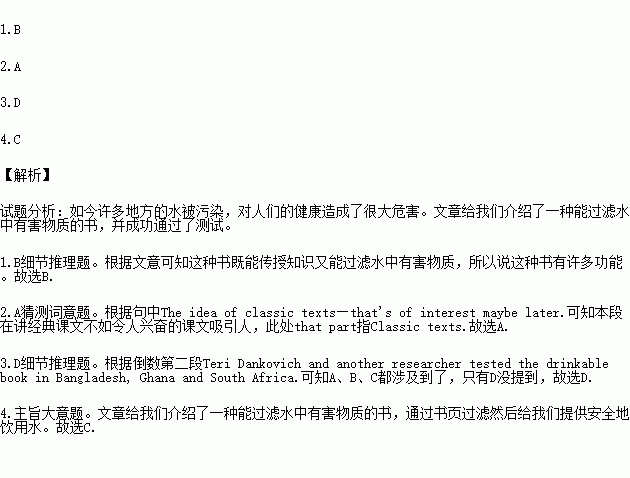题目内容
The expression “a thirst for knowledge" may soon have a new meaning for millions of people who have no way to get clean water. Researchers have developed a book with specially treated pages that can turn dirty water into clean and drinkable water. They say their invention could improve the lives of many in the developing world.
About 700 million people around the world are at risk of disease or even death because their drinking water is not clean. The water is polluted by harmful bacteria.
The book contains 25 pages. Each page is about one millimeter thick. The pages contain very small particles (微粒) of silver. The pages can be used as filters(过滤器)to remove harmful microorganisms (微生物) that can pollute drinking water. The filter kills the organisms that pass through it.
Pictures on the pages show the dangers of dirty water and how to use the book for those unable to read. The pages are made of filter paper. They are designed to be torn from the book. Water can be poured through the paper to be cleaned.
Ms. Dankovich, the inventor, says each page can treat up to 100 liters of water. She recently presented her invention at the meeting of the American Chemical Society in Boston, Massachusetts. She was asked whether she had considered adding classic literature on the book's pages.
"The idea of classic texts—that's of interest maybe later. We have discussed a little bit more exciting text. But we really haven't had the time to go through that part," she says.
Teri Dankovich and another researcher tested the drinkable book in Bangladesh, Ghana and South Africa. The tests proved to be successful.
Water for Life, a non-governmental organization, has provided financial support for the project.
1.What do we learn about the book from the text?
A. It sells well around the world.
B. It has pages with several functions.
C. It is about environment protection.
D. It can treat about 100 liters of water.
2.What does the underlined phrase "that part" in Paragraph 6 refer to?
A. Classic texts. B. Invention presentation.
C. Exciting discussion. D. Financial support.
3.In which country did not the researchers test the drinkable book?
A. Bangladesh. B. Ghana
C. South Africa. D. America.
4.What is the main idea of the passage?
A. Researchers have found a way to save those being ill.
B. Millions of people are in great need of drinkable water.
C. Book pages could provide safe drinking water.
D. Knowledge is as important as drinkable water.

